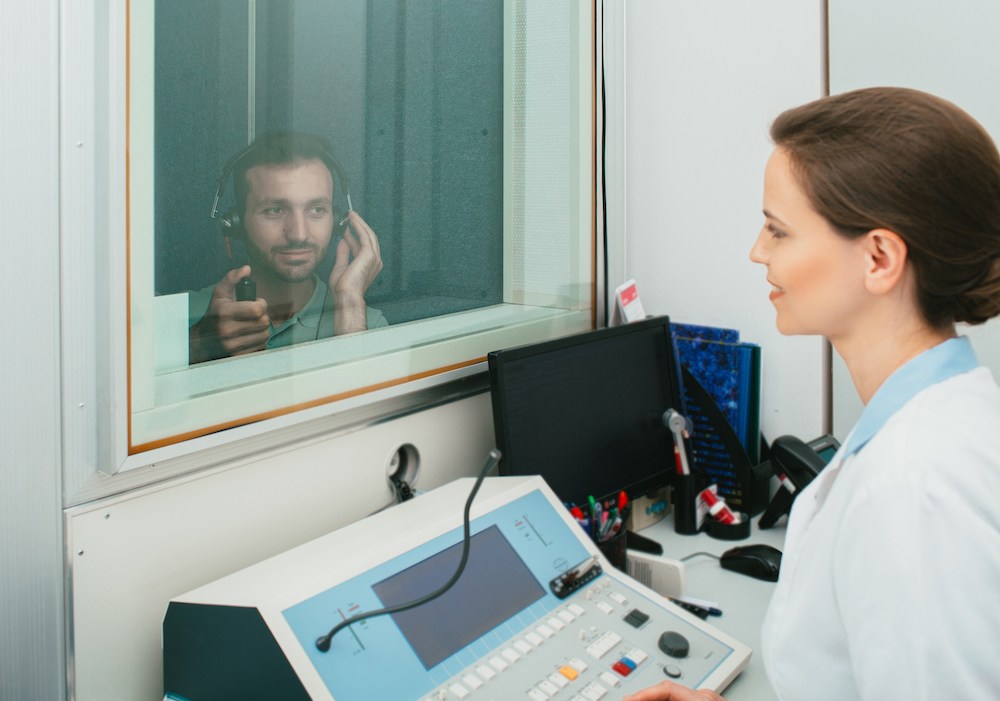The Impact of Hearing Tests on Quality of Life
Your hearing connects you to nearly everything in your daily life, from

By: admin | August 28, 2024
Experiencing sudden hearing loss can be a shocking and life-altering event, affecting not just your ability to hear but also your emotional well-being. The sudden change in your hearing can lead to feelings of helplessness, sadness or even frustration as you adjust to a world that seems less accessible. These emotions are a natural response to such a significant change, and it’s important to acknowledge them as part of the process.
The impact on your emotions can be profound. You may find yourself withdrawing from social situations, feeling isolated or disconnected from loved ones or struggling with a sense of loss. It’s not uncommon to experience anger or irritability as you confront the challenges that sudden hearing loss brings. These feelings, while difficult, are a normal part of adjusting to this unexpected transition.
However, it’s crucial to recognize that you don’t have to face these emotions alone. Seeking support from friends, family or an audiologist can make a significant difference in how you cope. Understanding that these reactions are normal is the first step toward managing them. By addressing your emotions head-on and exploring strategies to adapt, you can work through the emotional impact of sudden hearing loss and find ways to regain control over your life. With time, patience and the right support, you can overcome the emotional challenges of sudden hearing loss and move forward with confidence.
Typically, sudden hearing loss affects just one ear, and the hearing loss might be partial rather than complete. For some, the change is immediate, while for others, it develops over the course of a few days. The key characteristic of sudden hearing loss is the rapid decline in hearing ability, usually occurring within 72 hours.
If you suspect you’re experiencing sudden hearing loss, it’s essential not to dismiss it as a temporary issue. While conditions like allergies, earwax buildup or sinus infections can lead to hearing loss, sudden hearing loss may also signal a more serious underlying problem. Ignoring it and hoping it will improve on its own could result in permanent damage.
In some cases, hearing may return on its own, but this is not something to rely on. Early intervention is crucial, as the sooner you receive hearing loss treatment, the better your chances of recovering your hearing. Whether you notice a sudden drop in hearing or a gradual decline over a few days, it’s important to seek medical attention immediately.
Sudden hearing loss can manifest in various ways. You might notice that sounds become muffled or that a normal speaking voice suddenly sounds like a whisper. Some people first realize something is wrong when they struggle to hear during a phone call. Others may experience a loud “pop” in their ear just before their hearing diminishes. Regardless of how it presents, sudden hearing loss should be treated as a medical emergency, and seeing a doctor right away is crucial.
Sudden hearing loss can trigger a whirlwind of emotions. Feelings of confusion, fear, frustration or even anger may arise. This emotional turmoil is a natural response to such an abrupt change in your life.
It’s important to understand that it’s okay to feel these emotions. They are part of the process of coming to terms with sudden hearing loss. The key is not to let them overwhelm you but rather use them as motivation to seek help and find ways to adjust your daily life. Have you considered how hearing loss could affect your mental well-being? It’s an aspect many people don’t consider, but it’s essential to understanding the full impact of hearing loss.
Hearing loss and mental health are closely connected. Studies show that those with hearing loss often experience feelings of anxiety, depression and loneliness. By acknowledging this link, you can better equip yourself with strategies to maintain both your hearing health and mental wellness.
Sudden hearing loss can profoundly affect your relationships with family, friends and partners. Communication, which is the foundation of any relationship, becomes more challenging when hearing is suddenly impaired. The abrupt change can create barriers that strain even the closest connections.
In family settings, sudden hearing loss may lead to misunderstandings and frustration. Loved ones may struggle to adjust to your new way of communicating, and you might find it difficult to follow conversations, especially in noisy environments like family gatherings. This can lead to feelings of isolation, as you may feel left out of important discussions or unable to participate fully in the activities you once enjoyed.
Among friends, the impact can be just as significant. Social interactions often rely on casual conversations and shared experiences, but sudden hearing loss can make these moments more difficult. You might find yourself withdrawing from social situations to avoid the frustration of trying to keep up with the conversation. This withdrawal can lead to a sense of loneliness, as friends may not fully understand the challenges you’re facing.
In a partnership, sudden hearing loss can create emotional distance. The ease of spontaneous communication may be lost, and simple misunderstandings can escalate into larger issues. Your partner may feel unsure of how to support you, while you might feel a sense of loss or frustration over the sudden change in how you connect with each other. It’s important to have open and honest conversations about these challenges, as well as to seek ways to adapt together.
While sudden hearing loss can put a strain on relationships, it also offers an opportunity for growth and understanding. By openly discussing your experiences and finding new ways to communicate, you and your loved ones can strengthen your bonds and work through this challenge together.
Sudden hearing loss can be a deeply unsettling experience, affecting not only your ability to hear but also your emotional well-being. The abrupt change can lead to a range of emotional challenges, including anxiety, depression, frustration and even grief. Therapy can play a crucial role in helping you navigate these emotional issues, offering a supportive space to process your feelings and develop coping strategies.
One of the primary benefits of therapy is that it provides a safe environment to express the emotions that come with sudden hearing loss. The experience can trigger feelings of loss, as you grieve the sudden change in your ability to hear. Therapy allows you to work through these feelings at your own pace, helping you understand and accept the new reality. By acknowledging and exploring these emotions, you can begin to heal and move forward.
Therapy can also address the anxiety and depression that often accompany sudden hearing loss. The uncertainty of the future, coupled with the challenges of adjusting to new communication methods, can be overwhelming. A therapist can help you identify the sources of your anxiety and depression and work with you to develop strategies to manage these feelings. This might include mindfulness techniques, cognitive-behavioral therapy (CBT) or other therapeutic approaches designed to reduce stress and improve your mental health.
Additionally, therapy can help you rebuild your confidence in social situations. Sudden hearing loss can make it difficult to communicate, leading to feelings of isolation and withdrawal from social interactions. By working through these challenges in therapy, you can regain your sense of self and feel more comfortable engaging with the world around you.
Sudden hearing loss is a medical emergency that requires prompt diagnosis to increase the chances of recovery. The process of diagnosing sudden hearing loss involves a combination of medical history, physical examination and specialized hearing tests. Early intervention is crucial, so understanding the steps involved in diagnosis can help you know what to expect if you or someone you know experiences this condition.
When you first report symptoms of sudden hearing loss, your healthcare provider will begin by taking a detailed medical history. They will ask about the onset of your symptoms, any recent illnesses or injuries and whether you have experienced any other symptoms like dizziness or ringing in the ears (tinnitus). This information helps the provider rule out other possible causes of hearing loss, such as infections, earwax buildup or a head injury.
Next, a physical examination of the ear is conducted. The healthcare provider will use an otoscope to look inside your ear canal and check for any visible obstructions or abnormalities, such as earwax, fluid or damage to the eardrum. While this step is important for ruling out external causes of hearing loss, sudden hearing loss typically involves the inner ear, so further testing is usually required.
The most critical part of diagnosing sudden hearing loss is a hearing test, or audiogram. This test measures your ability to hear different sounds at various pitches and volumes. You will be asked to listen to tones through headphones and indicate when you can hear them. The results are plotted on an audiogram, which helps determine the degree and type of hearing loss. In cases of sudden hearing loss, the audiogram typically shows a significant drop in hearing ability in one ear.
In some cases, additional tests may be needed to identify the underlying cause of the sudden hearing loss. Imaging tests like an MRI or CT scan can help detect issues such as tumors, blood vessel problems or other abnormalities in the ear or brain that could be affecting your hearing. Blood tests may also be conducted to check for infections or autoimmune conditions that might be contributing to the hearing loss.
By combining these diagnostic tools, healthcare providers can accurately diagnose sudden hearing loss and determine the most appropriate treatment plan. Early diagnosis and treatment are key to improving the chances of recovering your hearing, so if you experience sudden hearing loss, it’s important to seek medical attention immediately.
Sudden hearing loss is a serious condition that requires prompt treatment to improve the chances of recovery. The treatment approach depends on the underlying cause, but several options are commonly used. Early intervention is key to maximizing the chances of regaining hearing.
Corticosteroids are one of the most common treatments. These anti-inflammatory drugs, taken orally or through injections into the ear, help reduce inflammation in the inner ear, which can aid in recovering lost hearing. If a viral or bacterial infection is suspected, antiviral medications or antibiotics may be prescribed to target the specific cause of the hearing loss.
For cases related to autoimmune disorders, immunosuppressive drugs may be used to prevent the immune system from attacking the inner ear. Another option, hyperbaric oxygen therapy (HBOT), involves breathing pure oxygen in a pressurized chamber to increase oxygen flow to the inner ear, potentially aiding in the healing process.
If hearing does not fully return, hearing aids might be recommended. These devices can amplify sounds and improve communication, helping you adapt to the hearing loss. Early diagnosis and treatment are crucial, so seeking medical attention right away is essential if you experience sudden hearing loss.
If you’re seeking more information or wish to schedule a consultation, you can reach out to the staff at EarTech Audiology by calling our Ogden, Brigham City or Farr West, Utah offices at: (866) 464-1008.
We encourage you not just to cope with this change but thrive despite it. Reach out today and let us help guide you towards better hearing health.
Tags: hearing loss and mental health, hearing loss symptoms, hearing loss testing

Your hearing connects you to nearly everything in your daily life, from
By: admin | October 20, 2025

Summer puts your hearing aids through different challenges than the rest
By: admin | July 29, 2025

Many people notice gradual changes in their hearing but don’t think
By: admin | June 20, 2025
